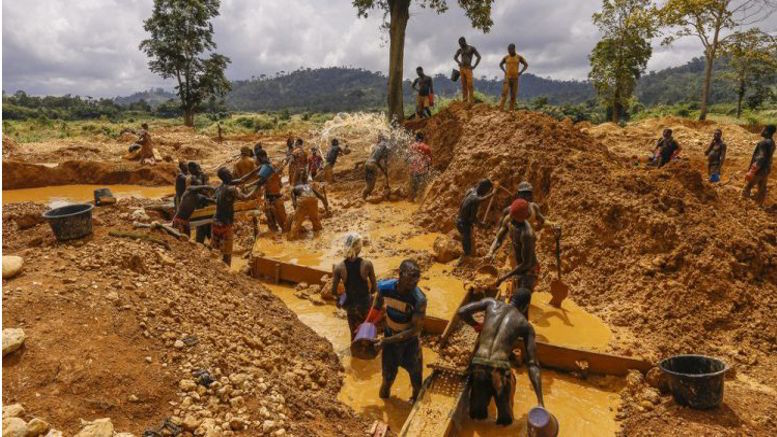The IMANI Center for Policy & Education Ghana has warned that illegal mining is now posing a direct threat to the country’s energy infrastructure, with potentially catastrophic consequences for national security, economic growth, and community safety.
According to IMANI, illegal miners are now encroaching dangerously close to gas pipelines in the Ashanti and Western regions, lifelines that supply natural gas to thermal power plants critical to Ghana’s energy supply. These underground activities, the think tank warned, could result in deadly explosions and massive infrastructure loss.
“The Board Chairman of Genser Energy, Nana Otwasuom Osae Nyampong VI, sounded a sharp warning.
“Miners prospecting under these pipelines are playing with fire, literally.”
IMANI Center for Policy & Education Ghana
The alarm is not just hypothetical. Judith Adjobah Blay, CEO of the Ghana National Gas Company, confirmed ongoing illegal mining activity near the Atuabo-Kumasi gas pipeline.
This key pipeline transports natural gas from the Atuabo processing plant in the Western Region to thermal power stations inland. Its safety is paramount to keeping the lights on for industries, hospitals, and households across the country.

Despite government surveillance and public education efforts, galamsey operators continue to dig dangerously close to these pipelines.
IMANI noted that enforcement, while necessary, has proven insufficient to curb the scale and persistence of the activity. The organisation emphasised that Ghana must look beyond punitive approaches to address the deeper socio-economic drivers of illegal mining.
“The economic stakes are high.
“Interruptions or damage to gas supply affect power generation reliability, which cascades into reduced industrial productivity, higher energy costs, and ultimately slower economic growth.”
IMANI Center for Policy & Education Ghana
The think tank also highlighted the broader environmental and agricultural toll of galamsey. Rivers are being polluted with mercury and other toxic chemicals, fertile farmlands are being destroyed, and entire landscapes are left scarred.
Particularly worrying is the trend of cocoa farmers selling off arable land to miners in search of quick profits — a development that threatens both food security and Ghana’s cocoa industry.
Galamsey Threat Intensifies

In response to the crisis, the government launched a new initiative, the Responsible Cooperative Mining and Skills Development Programme (rCOMSDEP).
Designed to provide alternatives to illegal mining, the programme seeks to transition small-scale miners into formalised, environmentally responsible cooperatives. It also offers vocational training and prioritises the restoration of degraded lands.
“rCOMSDEP’s success will depend on genuine community engagement, access to training and resources, and incentives strong enough to persuade miners to abandon illegal operations.”
IMANI Center for Policy & Education Ghana
While the initiative has been broadly welcomed as a step in the right direction, IMANI was quick to caution that it is “not a silver bullet.”
The fight against galamsey requires a multi-sectoral strategy involving not only government enforcement agencies but also traditional leaders, civil society, and international development partners.
“This is about more than law enforcement.
“It is about safeguarding the foundation of Ghana’s industrialisation and economic progress.”
IMANI Center for Policy & Education Ghana

IMANI urged security forces to prioritise the protection of critical infrastructure such as gas pipelines.
It also called on local chiefs and opinion leaders to promote legal and sustainable mining practices and encourages development agencies to invest in economic diversification projects that reduce the country’s over-reliance on small-scale mining.
“The ongoing risks to gas pipelines underline the precariousness of Ghana’s energy future.
“These pipelines power critical thermal plants central to Ghana’s goal of reliable, affordable electricity.”
IMANI Center for Policy & Education Ghana
Echoing the words of the Lands Minister, IMANI underscored the importance of restoring environmental balance: “To truly ‘turn waters blue and forests green,’ Ghana must commit to long-term reforms that combine enforcement, education, viable economic alternatives, and institutional coordination.”
As the nation grapples with the complex challenge of illegal mining, it has become increasingly clear that protecting Ghana’s energy infrastructure is not just a technical issue, it is a matter of national survival.
Without urgent and sustained action, the consequences could ripple through every sector of the economy.
READ ALSO: Ghana Set to Smash All 2025 Economic Targets – IC Research Hails Strong H1 Performance



















